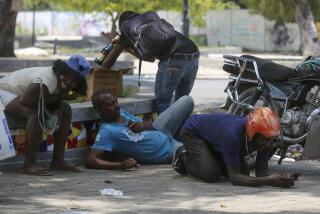U.N. Assails Syria in Hariri Inquiry
- Share via
UNITED NATIONS — A U.N. report released Thursday on the assassination of Rafik Hariri says that Syria bears primary responsibility for the political tension that preceded the attack and that the president of Syria had threatened the former Lebanese prime minister.
The report did not assign blame for the Feb. 14 bomb attack that killed Hariri and 19 others, but it dramatically increased pressure on Syria to remove its troops and intelligence agents from Lebanon. It also called for an international investigation.
The fact-finding mission, led by Irish Deputy Police Commissioner Peter Fitzgerald, criticized a Lebanese government investigation as “seriously flawed” and recommended that the leaders of its security services leave office to allow a more credible inquiry.
Lebanese investigators removed evidence from the scene, including damaged cars, and brought other vehicle parts to the site days after the assassination, moves the report termed “gross negligence” verging on criminal action.
Lebanese President Emile Lahoud urged U.N. Secretary-General Kofi Annan to do whatever was necessary to uncover the truth behind the Hariri assassination, signaling that Beirut would accept an international inquiry.
On Wednesday, the Lebanese judge who was overseeing the investigation of Hariri’s death abruptly stepped down, saying he was too busy to continue the work. “I am tired, it’s enough,” Michel Abu Arraj told the Lebanese Daily Star newspaper. “I submitted my resignation and that is that.”
The United Nations report examined Hariri’s growing discontent with Syria’s influence in Lebanon and the spiraling power struggle that led to his death.
Hariri had clashed for months with Lahoud over a possible amendment to the constitution allowing the pro-Syria president to serve three more years.
The report quoted Hariri’s aides and friends as saying that Syrian President Bashar Assad had told him in a meeting in Damascus, the Syrian capital, last summer that opposing Lahoud was tantamount to opposing the Syrian leader.
Assad also told Hariri that he “would rather break Lebanon over the heads of Hariri and [Druze leader Walid] Jumblatt than see his world in Lebanon broken,” the report said.
There is no Syrian account of the meeting, but the report said that the accounts from Hariri’s confidants were so similar as to almost be verbatim. Hariri told them he even thought of leaving the country.
In the weeks after the meeting, Hariri quietly pushed a U.N. Security Council resolution, which was adopted in September, demanding that foreign forces withdraw from Lebanon.
“Clearly, Mr. Hariri’s assassination took place on the backdrop of his power struggle with Syria, regardless of who carried out the assassination and with what aim,” the report concludes.
The assassination upended the political status quo in Lebanon, provoking a groundswell of popular and international outrage and forcing Assad to pledge to withdraw.
The U.N. report emerged against a backdrop of mounting unease in Lebanon. Two car bombs have struck Christian enclaves near Beirut within the last week, which heightened fear that Syria may try to destabilize Lebanon as it withdraws.
Aware of the effect the report might have in Lebanon, Annan delayed its release for nearly four hours while he went over the details with Fitzgerald, then briefed leaders of Lebanon, Syria, the United States and France by phone, U.N. officials and diplomats said.
The Syrian ambassador to the U.N., Fayssal Mekdad, responded angrily to the report, calling it “one-sided,” full of rhetoric and devoid of proof.
“I was not there when President Assad talked to Mr. Hariri, and nobody else was there,” he said. “I think nobody has the right to speak [about] such a meeting.” Asked whether Syria had a hand in Hariri’s killing, he said, “I can categorically reject such allegations. Syria would do no such thing. It is morally unacceptable.”
Although many diplomats found the report unusually forceful, there was widespread support for a resolution likely to be sponsored by France and the U.S. authorizing a follow-up inquiry.
In Lebanon, opposition leaders were keen for the U.N. to legitimize their accusations against Syria and its Lebanese allies, and to build pressure for an international investigation.
“The report will help all Lebanese to understand what’s going on, and to see that it’s their own government that’s terrorizing and harming them,” said Nayla Mouawad, an opposition lawmaker from northern Lebanon. “These people should know that they can’t get away with murder.”
Preparations for May parliamentary elections have been frozen. Syrian-backed Prime Minister Omar Karami was to assemble an interim Cabinet, but he wants the opposition, which has gained massive popular support, to participate.
Opposition leaders say they won’t take part unless Lebanon’s security chiefs resign, an international investigation of Hariri’s death is launched and a timetable is set for a Syrian withdrawal.
“We told Karami, ‘Go ahead, form the Cabinet and we won’t participate, you’ve got the majority,’ ” said Samir Franjieh, a prominent member of the opposition. “But he wants to end the demonstrations, he wants to end the movement. He’s personally afraid, because he can see his political end.”
*
Farley reported from the United Nations and Stack from Beirut.
More to Read
Sign up for Essential California
The most important California stories and recommendations in your inbox every morning.
You may occasionally receive promotional content from the Los Angeles Times.









